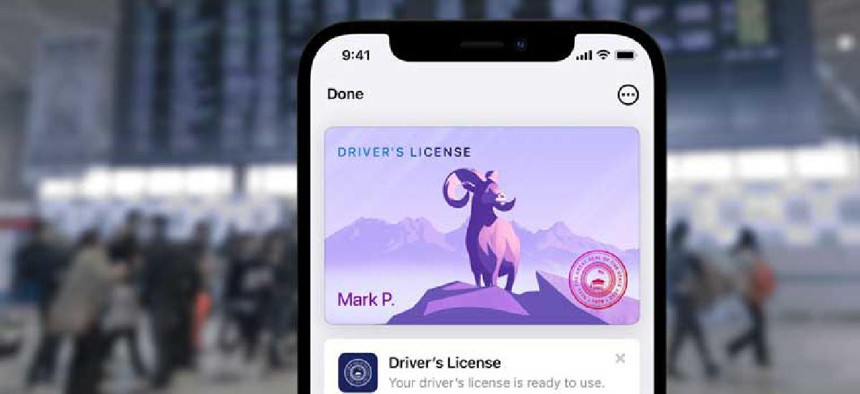States to offer digital driver’s license via Apple Wallet app


Connecting state and local government leaders
The tech company is working with states to create digital IDs from driver’s licenses for the Apple’s Wallet app.
Several states will soon allow their residents to securely add a digital driver’s license or state ID to the Wallet app on their iPhone and Apple Watch, Apple announced this week.
Arizona and Georgia will be the first to roll out this feature, with Connecticut, Iowa, Kentucky, Maryland, Oklahoma and Utah to follow. The Transportation Security Administration will allow users at select airport security checkpoints to verify their identity with the digital ID in Wallet, company officials said.
To enable this feature, iPhone users scan their driver’s license or state ID card and then take a selfie. Both are sent to the state that issued the ID to verify the information. In addition, users will be instructed to complete a sequence of facial and head movements during the setup process as an additional security step.
Once the user’s identity is verified, the digital ID will be added to each customer’s Wallet, an Apple app where users can store credit cards, transit passes and tickets. These digital IDs are securely associated with the device’s corresponding Apple ID to manage the information across multiple devices. Apple’s iCloud encrypts Wallet data when it’s sent over the internet or stored on the company’s servers.
However, implementation may be more complex than Apple suggests, according to Armen Najarian, security researcher at Outseer, an RSA company.
“Digitizing state identification will be convenient for consumers and presents an opportunity to reduce common fraud, like identity verification and reducing the use of fake IDs. But it also opens another door for personal information to be compromised,” Najarian said. “As more states consider allowing personal identification to be digitized like this, it's imperative to prioritize even stronger account takeover controls to keep bad actors at bay. Federal action will be necessary to ensure all states are abiding by the same digital fraud, privacy and cybersecurity standards so that certain states aren't more vulnerable to fraud than others."
Several states have been experimenting with digital driver’s licenses.
Louisiana’s LA Wallet is a legal driver’s license jointly designed by the Office of Motor Vehicles, the State Police and the Department of Public Safety. It was developed for free by Louisiana software firm Envoc and is currently used by 670,000 state residents across 1.2 million devices.
In April, Utah ran a pilot program testing mobile driver’s licenses. Its version is different from other efforts, in that it is not a photo or digital version of an ID card. Rather, it uses standards from the American Association of Motor Vehicle Administrators and the International Organization for Standards (ISO) that enable security measures such as encryption and provide privacy protections that allow users to determine the data they share.
That same month, the Department of Homeland Security announced it was looking for information on security standards and requirements for mobile or digital driver's licenses to enable federal agencies to accept these credentials.
“Utah has always been a forward-looking state. We regularly hear from people who want to access their driver license through their phones,” said Jess Anderson, commissioner of the Utah Department of Public Safety. “This is a great opportunity for Utah to work with Apple in an innovative use of technology. This secure mobile license adds convenience while helping keep Utah safe.”
The TSA and states taking part in the early rollout will provide more information at a later date about when the service will be available, including which TSA security checkpoints and lanes will accept this method of verification.




